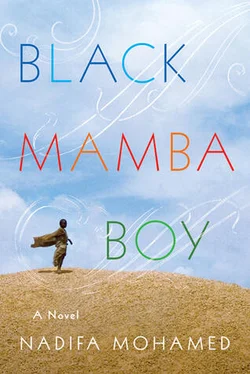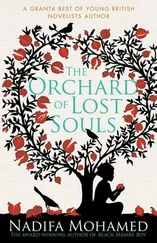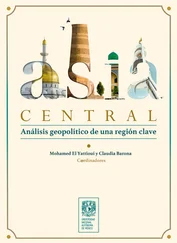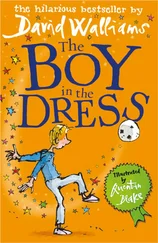Sometimes Sidney stopped reading and reached for a map. “Over here in Burma was the worst hell, North Africa was a picnic in comparison. I can handle desert heat but a man isn’t made to fight in a jungle, gave me the fucking willies. Me and the Somalis in the battalion were going barmy. When you can’t see the sky or feel a breeze it does something funny to a fella. The Japs would just appear out of nowhere, slit your throat, and jump back into the bushes. Look, a Somali mate put this on my arm.”
Sidney rolled up his sleeve and revealed a dark blue snake cut into his flesh. Jama touched the livid serpent resting on Sidney’s biceps like a python bathing on a hot boulder. It reminded him of the signs nomads cut into their camels. The snake was Jama’s totem; perhaps Sidney would put one on his arm.
“I thought I was gonna die in that place, honestly and truly, I’m surprised to be sitting here, between Hitler and Hirohito I thought my number was up.”
Jama rolled up his sleeve, and gestured between his small hump of a biceps and Sidney’s.
“You want one?” laughed Sidney.
“Si.”
“You worked for Italians, eh? Well, I’ll make more a hash of a tattoo than an Italian would soldiering. Better you get one done in London.”
Jama took the map out of Sidney’s hands, found the pink spot Idea had said was Somaliland, moved his finger along the Red Sea coast, beyond Gerset, into Sudan and Egypt, to where a sea separated his old world from the new.
Sidney put his blackened fingernail in the blue sea of the cold north. “That’s where we are, lad. Right up in the North Sea. You’re a long way from home, aren’t you?”
Jama nodded.
Sidney ripped a piece off the map, took a pen out of his shirt pocket. “Jama, I live in London, by the river in Putney. If you ever need anything, come by and give me a bell.” Sidney wrote down his address in awkward capitals and gave it to Jama.
Jama walked the perimeter of the deck. The searchlight was switched off and a full moon beamed down on the sea, its reflection floating on the indigo waves. Light from the ship scintillated and sent stars over the water. Jama breathed in the cold salty air, found Bethlehem’s star, and blew a kiss to it. A whale cruised in the distance, cutting slowly through undulating waves, and Jama turned around to show someone the whale but the deck was deserted. He had never imagined such creatures existed, but every day brought new wonders, monsters and knowledge. Bethlehem would never believe his stories. How could he explain the size of a whale to her, how it shot a geyser from its back, how it lived in ice-cold water? Jama closed his eyes and pictured Bethlehem’s nighttime routine; she would check her chickens were safely locked up, then the goats, she would then take the half-empty pan off the fire and store the remains for breakfast. The day’s labor over, she would find Jama’s star, send her love, and then stretch out her lovely limbs on the mat that still smelled faintly of him and sing herself to sleep.
PORT TALBOT, WALES, SEPTEMBER 1947
The Runnymede Park hung close to the white chalk of England before reaching the Irish Sea, the Bristol Channel, and Swansea Bay. Beyond the tubes, funnels, and chimneys of the steelworks, thick smoke hung over Port Talbot. Jama went to Captain Barclay and received his fortune of eighty pounds in an envelope thick with notes. Another hundred pounds and he could live like a suldaan in Eritrea. When Captain Barclay asked if he would be staying on the Runnymede Park , Abdullahi, the serpent in paradise, whispered in his ear, “The next ship will earn you twice this one. If you stay on for a woman you will be the biggest fool in the world.”
Jama wrung his hands, looked over his shoulder at the broad sea, squeezed the envelope in his pocket. “I’ll come with you.”
Captain Barclay shook their hands in farewell and gave Jama his leaving card; his behavior had been marked down as “Very Good.” Jama stepped down onto his Promised Land and put a handful of cold earth into his pocket to take back to Gerset one day. Sidney gave Jama a salute as he left for the train station, a canvas sack thrown over his strong back.
The Somali men found their way to Port Talbot’s main street, and people observed their progress as if they were invaders. Jama felt very conspicuous; everyone was so pale, their skin looked cold to the touch. It was September but a chilly wind swept through the cramped streets and vague specks of rain floated on the wind. Workmen spat and made obscene gestures as the Somalis walked past, and wild-haired women stood in doorways, some holding their brooms out in front of them like weapons, others with come-hither looks in their eyes. The Ferengis’ clothes had been made for fatter people, and large holes gaped in their stockings and the cardigans had been patched and darned. They found the Eidegalle hostel, a damp, brown building in a particularly poor part of town. Here they would sleep, eat, socialize; it was their bank and post office, their only sanctuary while they stayed in the Wild West. A Welsh woman named Glenys worked for Waranle, the hostel owner. She was a bubbly woman, her blond-white hair curled and face painted every day. Glenys enjoyed using her smattering of Somali: “Maxaad sheegtey, Jama?” she would say in her singsong voice, “What you saying, Jama?”
The older men did not enjoy going into town. “What’s the point? They look at us as if our flies were open.” Only rarely could Jama persuade Abdullahi to take him out. Abdullahi would always wear shirt, tie, waistcoat, best suit, and trilby to impress on the locals that he might be colored but he was a gentleman of means. Jama eschewed the stiff, itchy jackets and knitted hats that Glenys tried to force on him. He hated the smell of damp wool, and this foreign cloth brought his skin out in red welts, so he went out in just his thin Egyptian shirts, to everyone’s disapproval.
“Look at this, Jama, another sign, ‘No Blacks.’ There aren’t any other blacks in this town but us! Let’s go back to the hostel,” fumed Abdullahi, pointing out the handwritten sign on the pub door.
“This is just like Eritrea.”
“Of course, and you’d better get used to it, it’s like this all over the world for black men.”
A girl was watching from a café doorway and beckoned them over. Abdullahi tugged at Jama’s sleeve to ignore her, but Jama could not, he walked over to the entrance and sat down at the wooden table.
“There’s nothing to smile about, Jama, she’s just too desperate to refuse our money,” Abdullahi chastised him as he ordered two teas and sat in his finery, looking forlorn amid the cheap clutter.
They finished the tea and Abdullahi left a penny tip for the waitress. “Thank you, sirs!” she exclaimed and bowed before them. It was the first time a Ferengi had ever bowed to Jama, so he gave her another penny to see what she would do. She kissed Jama on the cheek, closed the café door, and ran with her money over to the grocer’s.
Abdullahi laughed. “That’s probably the biggest tip of her life.”
“Honestly?”
Abdullahi continued, “Oh yes, they have a saying in this country, all fur coat and no knickers, understand? On the outside everything looks grand and pompous, but underneath…” Abdullahi waved his hand disgustedly.
“Underneath it’s just abaar iyo udoo-lullul, hardship and banditry, yes, I understand.” Jama laughed.
_______
After their few excursions outside, Abdullahi said it was too cold for him. He would not venture outside until there was another ship to sign on to. Jama became miserable in the hostel, he brooded on his loneliness and felt as if Bethlehem was lost to him, separated by time and distance. He sank deep into melancholy, and spent all his time in his freezing bed, in a room that stank of damp and gas, a sooty old paraffin heater burning all day giving him headaches and nosebleeds. Out the dirty window he could see the faded green hills, molting in patches like a sick jackal’s fur, kissing the low dark sky.
Читать дальше
Конец ознакомительного отрывка
Купить книгу












